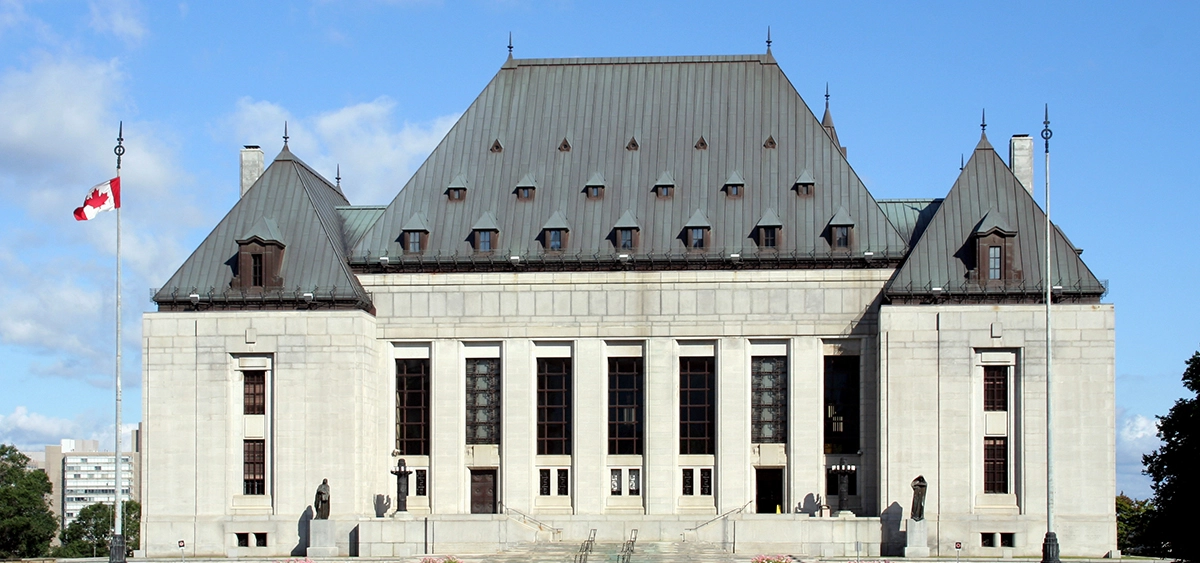
Stephanie Belmer – auxiliaire juridique pour l’honorable juge Karakatsanis (2024-2025)
Stephanie Belmer is currently a third-year student at the Faculty of Law at McGill University. Before studying law, she completed a PhD in Social and Political Thought at York University and an MA in Art History at the Courtauld Institute of Art. She also taught Philosophy, Liberal Arts, and Humanities at Vanier College in Montreal, Quebec.
What interested you to apply for a Supreme Court clerkship?
For a long time, I’ve been drawn to contexts that combine research and writing. Former clerks have told me how much they enjoyed the challenge of thinking through complex cases that have no obvious solution. There is an added intensity to the work, I think, because these judgments can have a lasting impact on the society in which we live. All of this intrigued me enough to apply.
What do you look forward to the most about this experience?
Coming from McGill, I’ve been trained to see legal questions in a particular way. I look forward to working with others from different backgrounds, who may think about and approach such questions otherwise. I imagine this will make for a dynamic set of relationships and conversations.
Jeanne Mayrand-Thibert – auxiliaire juridique pour l’honorable juge Rowe (2024-2025)
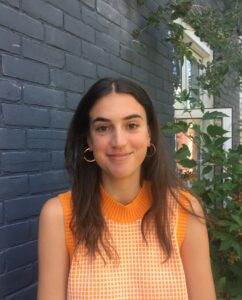 Pourriez-vous vous présenter svp?
Pourriez-vous vous présenter svp?
Avant de commencer mon BCL/JD, j’ai complété un baccalauréat en science politique et sociologie à McGill, où mon intérêt pour le droit dans son contexte social s’est développé.
Lors de mon passage à la Faculté, j’ai travaillé pour plusieurs professeures dans des domaines variés et complété une cléricature à la Cour d’appel auprès des honorables juges Patrick Healy et Christine Baudouin. J’ai aussi été impliquée dans la mise sur pied d’une nouvelle clinique juridique qui opère dans un centre de jour pour personnes en situation d’itinérance. Je suis reconnaissante d’avoir pu bénéficier d’un mentorat extraordinaire dans toutes ces expériences.
Qu’est-ce qui vous a intéressée à postuler comme auxiliaire juridique à la Cour suprême?
Mon désir de comprendre la relation entre la justice et le droit—l’examen de leur confluence ou du fossé qui les sépare parfois—a animé tout mon parcours. Mon application à la Cour suprême est en quelque sorte la culmination de cet intérêt, puisque cette institution est sans doute l’une des plus importantes dans le développement du droit. Avoir la chance d’y travailler constituera une opportunité inégalée de comprendre comment les tribunaux façonnent les possibilités de justice dans la société canadienne.
Qu’est-ce qui vous enthousiasme le plus à propos de cette expérience à venir?
Je suis particulièrement enthousiaste à l’idée de collaborer avec les autres auxiliaires du cabinet du Juge Rowe, et de faire connaissance de toute l’équipe d’auxiliaires issus des quatre coins du pays. J’ai aussi hâte d’apprendre de nouveaux mentors et de mes pairs, et de me plonger dans des débats juridiques importants et stimulants!
Félix-Antoine Pelletier – auxiliaire juridique pour le très honorable juge en chef Wagner (2024-2025)
 Can you please introduce yourself?
Can you please introduce yourself?
Before all else, I would like to sincerely thank our Law Faculty and alumni community for helping me achieve this accomplishment. Over the years, McGill has provided me with the opportunity to intern in human rights law in Morocco (IHRIP), clerk at the Tribunal administratif du Québec (TAQ), volunteer, do competitive mooting in Québec civil law, and combine a minor in economics with my law degrees. And, thanks to the Mobile Legal Clinic (Clinique Juridique Itinérante) and Stikeman Elliott LLP, I became the well-rounded jurist I am today. Since June 2022, I am clerking for Justice Guy Gagnon at the Québec Court of Appeal. I was called to the Québec Bar in December 2022.
What interested you to apply for a Supreme Court clerkship?
To serve and to learn, essentially. It is a unique chance to give back to the legal profession and broader society. The Supreme Court of Canada resolves cases of national importance and fosters Canada’s legal landscape. It is both an honour and a privilege to take part in its work. It is also an excellent next step following clerking at the TAQ and QCCA. As an aspiring litigator, I am thrilled by the prospect of witnessing state-of-the-art advocacy, gaining invaluable insights at the country’s highest court, and refining my research and drafting skills.
What do you look forward to the most about this experience?
I am looking forward to learning from and collaborating with some of Canada’s brightest legal minds, with whom I hope to foster meaningful relationships. I am also excited to tackle complex legal issues in various areas while evolving in a stimulating environment. Clerking for Chief Justice Wagner will be an invaluable opportunity to deepen my legal education and pursue my long-term commitment to serving the society in which I live. It strikes me as both an exciting challenge and a deeply serious endeavour.
Katrina Bland – auxiliaire juridique pour l’honorable juge Jamal (2024-2025)
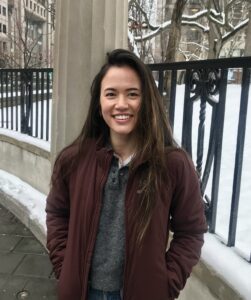 Can you please introduce yourself?
Can you please introduce yourself?
I grew up outside of Toronto and went to the University of Toronto for my undergrad in political science and international relations. Before law school, I spent a year working in a restaurant and for the G7 Research Group. At McGill, I made wonderful friends and worked closely with some inspirational professors. I am now clerking at the Federal Court of Appeal and am delighted by the variety of areas of administrative and public law I have the opportunity to explore.
What interested you to apply for a Supreme Court clerkship?
I was unsure I wanted to re-apply again this year, but clerking at the FCA has made me appreciate the immensity of the work done behind the scenes at courts. I find it incredibly fulfilling to help make the work of an individual judge easier, in any small way that I can, and applied in hopes of having the chance to do so again.
What do you look forward to the most about this experience?
I am really excited to have the opportunity to explore legal questions in depth while learning from Justice Jamal. I am also looking forward to meeting the other clerks and to facing the challenges of the year together.
Garima Karia – auxiliaire juridique pour l’honorable juge Kasirer (2024-2025)
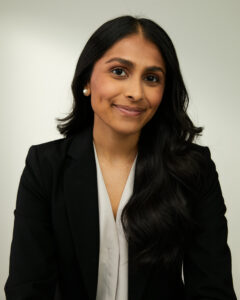 Can you please introduce yourself?
Can you please introduce yourself?
I was born in Toronto, and moved to Montréal to pursue my undergraduate degree in political science and history at McGill. I originally wanted to be an economist, and arrived at law school with some doubts about whether the program was for me. With the help of professors and friends, and despite the constraints of the pandemic, I quickly realized I loved studying law.
I am drawn to private and criminal law, and explored these interests further as an editor for the McGill Law Journal, student clerk at the Cour d’appel du Québec, and summer student at a boutique litigation firm in Toronto. I also enjoyed assisting professors with their research, and was able to work with Professors Jukier, Narain, and Christians during my time at the Faculty. I also spent a summer in Whitehorse, at the Yukon Human Rights Commission, through the Human Rights Internship program. I will clerk at the Court of Appeal for Ontario for my articles in 2023-2024.
Qu’est-ce qui vous a intéressée à postuler comme auxiliaire juridique à la Cour suprême?
Dès ma jeunesse, j’ai eu la chance de me retrouver à plusieurs reprises dans des espaces où je pouvais m’épanouir en anglais et en français. J’ai toujours trouvé que je pouvais approfondir ma compréhension d’une question ou enjeu en l’examinant sous deux angles linguistiques.
J’ai pu faire l’expérience de cette richesse bilingue durant mes études en droit à McGill et à la Cour d’appel du Québec, et je cherchais une expérience qui me permettrait de renouer avec ce sentiment. La Cour suprême constitue un lieu de travail juridique bilingue et bijural fascinant, où je pourrai non seulement continuer à progresser en tant que juriste dans les deux langues, mais aussi dans deux traditions juridiques.
What do you look forward to the most about this experience?
I am most looking forward to learning from both my colleagues and Justice Kasirer, and working with them on matters that affect a wide range of Canadians. One major reason that I’ve loved studying law is that it has taught me so much about Canada, and I look forward to continuing that apprentissage through my engagement with jurists from across the country.
Ana Qarri – auxiliaire juridique pour l’honorable juge Rowe (2024-2025)
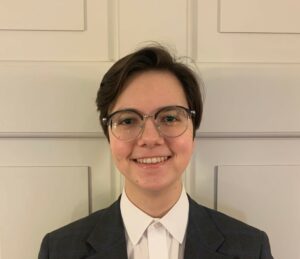 Can you please introduce yourself?
Can you please introduce yourself?
Before law school, I worked in public policy positions in Toronto, including at the Information and Privacy Commissioner of Ontario and at the Legislative Assembly. I have a strong interest in the regulation of emerging technologies and while at law school, I was a research assistant for Prof. Ignacio Cofone on privacy and AI law and an intern at the Samuelson-Glushko Clinic on technology and human rights law. Since graduating, I was a policy analyst at the TMU Leadership Lab, co-authored reports on the need for competition law reform, and currently, I am clerking for judges of the Court of Appeal for Ontario.
What interested you to apply for a Supreme Court clerkship?
In law school, I found every area of law that I studied academically interesting. The clerkships offer a unique opportunity to learn about how judges decide matters when the law is uncertain or outdated. I’ve had a great experience at the CAO, learning about the criminal and civil justice system in Ontario. I decided to apply to the Supreme Court because it is an opportunity to spend more time delving into unresolved legal questions, especially in public and constitutional law.
What do you look forward to the most about this experience?
I look forward to getting to know and learning from fellow clerks. I’ve built life-long friendships with my colleagues at the Court of Appeal and I’m sure I’ll have a chance to do the same in Ottawa. I’m also really eager to observe high-calibre advocacy in both official languages and to play a small part in the Supreme Court’s work deciding complex cases of national importance.
Emmett Bisbee – auxiliaire juridique pour l’honorable juge Martin (2023-2024)
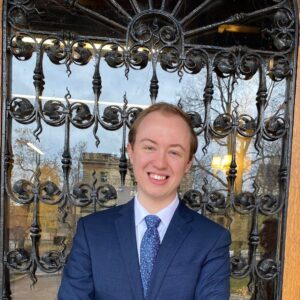 Can you please introduce yourself?
Can you please introduce yourself?
I grew up in Innisfil, Ontario. Prior to attending law school, I studied public policy and administration in Ottawa and worked for several federal government departments. At the Faculty of Law, I was an editor for the McGill Law Journal, a Group Assistant for the first-year Constitutional Law course, and a competitor in the Gale Cup Moot. Since graduating in 2022, I have been clerking at the Court of Appeal for Ontario.
What interested you to apply for a Supreme Court clerkship?
My experience as a judicial law clerk at the Court of Appeal for Ontario has been wonderful. In addition to working in all areas of law, it has allowed me to explore fascinating and recurring questions about judicial decision-making, such as when courts should show deference to trial judges or expert administrators, what counts as persuasive or binding authority, and how judges should consider whether lower court reasons are sufficient or disclose error. The exposure to oral and written advocacy has been invaluable as an aspiring litigator. I knew I wanted to continue this type of work.
What do you look forward to the most about this experience?
I am most excited to continue learning. It will be a privilege to collaborate with my judge and fellow clerks while working on wide-ranging cases of public significance.
Toutes nos félicitations également à Laurence Prud’homme, diplômée 2022 de notre programme de maîtrise, qui joindra le cabinet de l’honorable juge Suzanne Côté en 2024-2025!

